
views
Signs a Child May Be Gifted or Talented
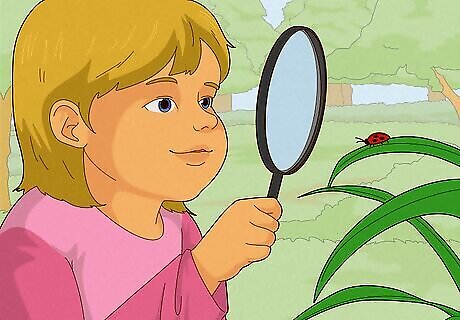
If you believe your child may be naturally gifted, look for these traits. Children can be naturally gifted in all kinds of different areas, not just academics, but gifted children often share many of the same traits, including: Excellent memory High alertness Large vocabulary for age High sensitivity Abstract thinking Strong curiosity Excellent problem solving Fast learner
Exploring Your Child’s Talent and Interests
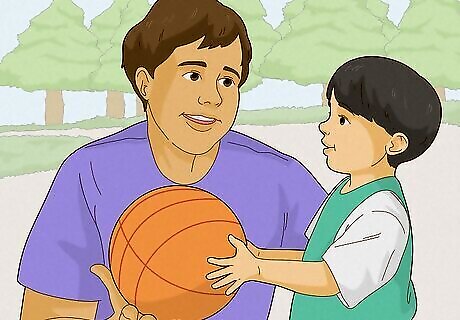
Sign your child up for many different extracurricular activities. One of the best ways to discover your child’s abilities is to have your child explore and engage in a wide variety of dramatically different activities. You can do this through formal or informal means. This way, not only will you be able to see how your child performs in different types of situations, but you’ll also be able to see what your child is most interested in. Consider signing your child up for athletic activities, artistic activities, and intellectual activities. Suggest activities to your child, but if they refuse to go, you should reconsider the activity. While having your child sign up for many extracurricular activities is a good thing, make sure that your child is not over-committed and still has time to be a kid. Make sure your child plays with peers and friends of different cultural and socioeconomic levels. You never know when someone from a different background will introduce an activity that your child will excel at.
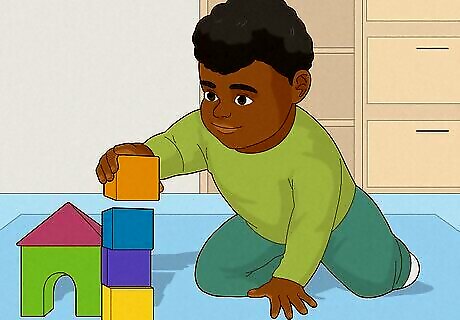
Observe your child at play. Take time to watch your child play and observe how your child plays and what your child does. Don't assume that your child's play is trivial or meaningless. A child will act and play in ways that may reflect differing natural, individual interests, intelligence, and abilities. When you observe your child: Make a journal of interesting things your child does when at play. What characterizes your child’s play? Is she thoughtful and deliberate or is she dramatic and emotional? This could give you great insight into her abilities. Think about the subject relevance or career relevance of what your child is doing. If your child likes to sort her Legos by colors and plans her building down to the smallest detail, perhaps she has natural organizational abilities. Observe your child at different types of play. See how she plays with other children, too.

Talk to your child about what she likes to do and about what she thinks she is good at. Oftentimes, your child will articulate the best insight into her own abilities. Don’t discount the fact that your child may actually know her and her talents better than anyone else. At the very least, your child will know her own likes and dislikes, which are often as important as natural talent. Ask your child what academic subjects she thinks she is best at as well as which she enjoys the most. Make sure you differentiate between enjoyment and talent. Ask your child if she thinks she’s good at any sports as well as which sports she enjoys the most. Ask your child if she thinks she is good at art and if she enjoys doing artistic things. Your child may not be able to articulate what she is good at. However, if she enjoys certain activities, this may point to a talent she is unaware of.
Thinking About Different Types of Intelligence
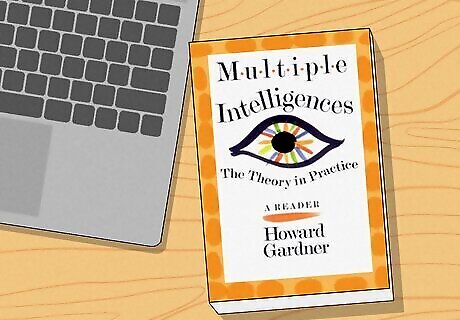
Learn about theories about types of intelligence. In the early 1980s Howard Gardner began to change the education world by publishing his book entitled "Theory of Multiple Intelligences." His theory at first established seven intelligences. He believes that each person varies by experiencing and expressing intelligence in different areas. He identified areas involved in the brain by mapping brain activity and as observed in broad cultural acceptance of varying abilities or intelligences and distinguishing the person's reactions to, interest in and ease of using concepts related to these intelligences.

Consider your child's visual-spatial ability. Think about whether your child has excellent visual and spatial abilities. People with great visual and spatial ability might not demonstrate excellence in other types of activities, but do shine when they focus on activities that are very visual. People with this sort of intelligence can be tracked into certain career paths in which they can be very successful. Consider: Does your child like to design things, look at maps, draw or doodle? Your child might enjoy activities that enable them to create models or charts. Your child might have a budding career as an architect or graphic designer.

Think about interpersonal ability. Interpersonal intelligence is defined as an individual's ability to socialize and interact with other people. Not everyone is gifted in this ability. If your child has strong interpersonal abilities then you might want to enroll them in specific programs that nurture this gift. Consider: They might enjoy leading or organizing efforts. See if your child is interested in extracurricular activities like Model United Nations or student government. Your child might have a career in sales, leadership, or politics in store for them.

Look into whether your child has intrapersonal intelligence. People with intrapersonal intelligence are really good at understanding themselves, their motivations, and they often look inward for direction and guidance. Children with intrapersonal intelligence might be more introverted rather than extroverted and may not be interested in group activities or socializing as much as other children. If your child demonstrates intrapersonal intelligence, they might be interested in self-directed learning, reading, and cause-and-effect analysis. Your child might be a gifted writer or thinker. Consider enrolling them in a creative writing program or encouraging them to start a collection. Try not to discourage your child's self-directed activities. They might just be figuring out the world on their own terms.
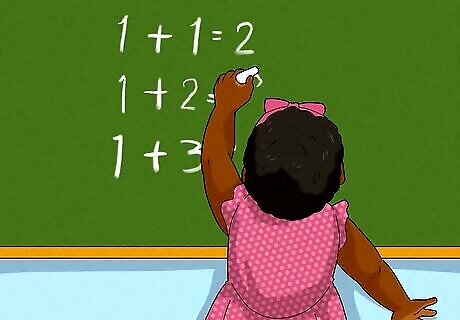
Determine if your child is a logical or mathematical thinker. Logical or mathematical thinkers are often very deliberate in their thinking. They reason things out. They calculate activities and consider consequences. If you believe your child is a logical or mathematical thinker, you should nurture their abilities. Consider: Does your child think in the abstract sense? Does your child like to explore the connections between things and people? Your child might like to experiment with things and solve problems. Your child might have a career as a scientist or mathematician in store.

Figure out if your child is a bodily-kinesthetic thinker. Bodily-kinethetic thinkers have a high level of control over their body, hand-eye coordination, and their range of motion. They can handle tools and objects with precision and skill. In addition, consider: Does your child like to build things by hand, and can they use their hands with precision? Bodily-kinethetic thinkers communicate and learn well through physical activity. Children who have bodily-kinethetic intelligence might be good things where they can use their hands or physically build things. They might be great surgeons, mechanics, or sculptors.

Consider if your child has linguistic intelligence. People with linguistic intelligence demonstrate a high command of language and words. They can articulate ideas well, can learn by listening and reading, and often enjoy communicating with others. Try not to confuse linguistic intelligence with a troublesome child who talks back. They might just be trying to learn or communicate. Children who are linguistic learners might like writing and reciting poetry, public speaking, or reading. Your child might be a budding politician or poet. Nurture linguistic learners by enrolling them in activities in which they write, read, or perform.
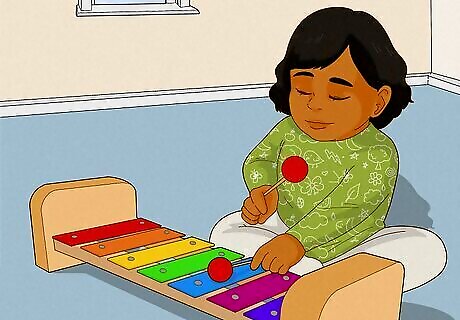
Evaluate whether your child has musical intelligence. People with musical intelligence are extremely sensitive to sound, rhythms, and all things aural. They are often drawn toward music and things musical. Does your child demonstrate a fascination with music? Can your child play musical instruments with skill or sing with perfect pitch? Consider enrolling your child in music lessons or have them join chorus or band at school.
Evaluating Your Child’s Abilities and Intelligence
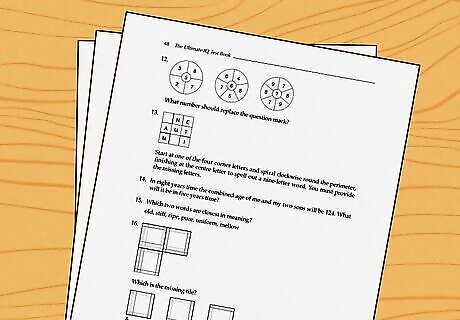
Have your child take an intelligence test. Sign your child up for a formal intelligence quotient (IQ) test done by a professional. IQ tests are designed to give you a general idea of your child’s intelligence. In this sense, intelligence is defined as cognitive abilities and the quickness that a person processes information. Fundamentally, IQ tests are supposed to measure broad intelligence, not general knowledge. If you choose to have your child take an IQ test, do so knowing that it is just one form of evaluation used to gauge natural abilities and talent. Know that IQ tests may not give you a full or accurate reading of your child’s abilities. It should be used in conjunction with other methods of evaluation to ascertain the full scope of your child’s abilities. Understand that IQ tests have been criticized as biased towards certain cultural and ethnic group, and should be given in the language that your child is most proficient in.

Sign your child up for an aptitude test. Aptitude tests are another type of formal evaluation that gauge your child’s natural abilities and talents. Aptitude tests are used to measure a person’s ability to develop skill or proficiency in a certain task or subject area. In this, many aptitude tests are different than IQ tests in that they will give you a better idea of your child’s ability to master certain subjects, skills, or ways of thinking.
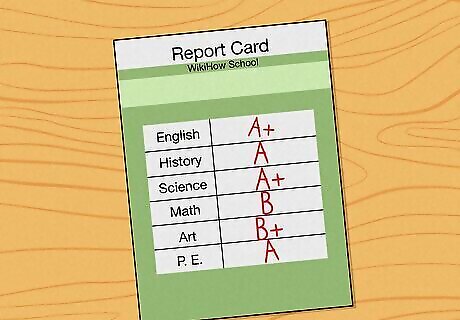
Audit your child’s grades. Take some time to gather your child’s current and past grades and evaluate them. Try to look at patterns over time in certain subject areas like English, math, science, and social studies. This should give you an idea about your child's proficiency and ability. However, when coming to a conclusion about your child’s grades, you should remember that while grades give you an idea of ability, they also reflect other factors: Your child’s interest. Teacher ability. The timing and environment that the subject is introduced in.

Talk to your child’s educators or caregivers. No matter what grade your child is in (daycare, pre-K or K-12), your child’s teachers and other supervisory figures can give you a great idea of your child’s interests and abilities. After all, teachers and caregivers (depending on the environment) might spend more time in an educational and mentoring capacity with your child than you. Schedule a meeting with your child’s teacher or caregiver. Ask them about your child’s interests and abilities. Ask them if they think there is a reason why your child excels in one area or does not excel in another.

















Comments
0 comment